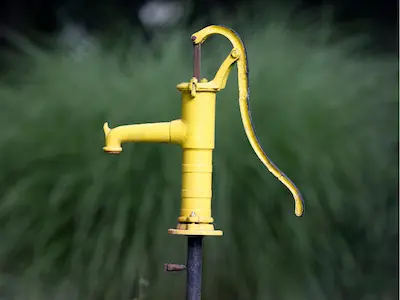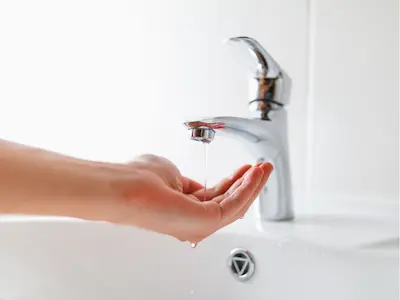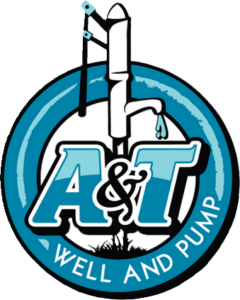When you have well water and a well pump that’s not working properly, that means…
If your well pump isn’t working, it’s likely impacting your water supply, which isn’t good for your home. A well pump that needs repair can cause a range of issues, from low water supply to murky water, and even some strange noises.
Don’t let your well pump suffer; instead, take advice from our well pump repair experts at A&T Well and Pump in Raleigh, NC. Join us as we share our top well pump troubleshooting tips to ensure you won't be spending unnecessary money on your well pump repair in 2026.
Table of Contents
Understanding Well Pump Troubleshooting

Well pumps are integral components of private water systems that extract groundwater from beneath the earth's surface and deliver it to homes for various purposes such as drinking, cleaning, and irrigation.
They are essential for households that rely on wells as their primary water source, providing a consistent supply of clean water without depending on municipal systems.
What Does a Well Pump Do?
The primary function of a well pump is to lift water from underground aquifers and deliver it to the surface. Depending on the type of pump, submersible or jet, the method of pumping varies, but the goal remains the same: to ensure a reliable supply of water for everyday use.
Understanding the basics of well pump troubleshooting is crucial for homeowners for several reasons:
- Early detection of issues
- Cost savings
- Maintaining efficiency
- Ensuring water quality
- Emergency preparedness
There are several common well pump repairs that homeowners often find themselves dealing with. You may be able to handle some of these issues yourself, whereas others will need a call to a professional, like the team at A&T Well and Pump.
#1: Diagnose the Problem with Your Well Pump
To determine the underlying cause of your well pump issues, you’ll first need to know what you’re dealing with.
Here are some of the common issues homeowners experience with a malfunctioning well pump:
You have no water
If you turn on your faucets and no water comes out, there may be a problem with your well pump’s operation or water supply.
You have low water pressure
If your water flow is weak or inconsistent, it could indicate issues such as a clogged filter, a malfunctioning pressure switch, or a problem with the well pump itself.
You have air coming out of your faucet
If you notice air coming out of your faucet, your pump may be pulling air instead of water. This happens when the water level in the well is too low or if there is a leak in the system.
You have dirty or cloudy water
If your water appears discolored or cloudy, it might signal sediment or contaminants entering your water supply, potentially due to issues with the well pump or well casing. Installing a sediment filter and raising the pump, if possible, can help combat this problem.
Your faucets are sputtering
If your faucets intermittently release bursts of air or water, it suggests air trapped in the water lines, often due to issues with the well pump’s pressure tank or air volume control.
Your power usage spiked unexpectedly
An increased spike in power usage can potentially indicate an issue with the well pump motor or electrical components drawing excessive current.
You hear unusual noises
A well pump that’s working properly won’t make strange noises. If you start hearing things you’ve never heard before, a well pump repair may be in your near future.
Your pump is cycling on and off
When you notice the pump is constantly running or stopping and starting, you may have a short-cycling issue on your hands.
#2: Check Electrical Components
If your well pump troubleshooting involves electrical components, start by turning off the power at the breaker box to ensure safety. Inspect wiring for damage or corrosion, and test voltage levels at terminals.
If power is running to the well head wires, there could be an issue with the wiring from the house to the well.
Verify the pressure switch's settings and functionality. If your pump uses capacitors, check for swelling or leaks. Ensure all components are properly grounded.

For any doubts or power failures, you never want to try to fix electrical issues on your own, so contact our Raleigh well pump experts to inspect your system safely and thoroughly.
#3: Address Water Pressure Issues

Maintaining proper water pressure in your well pump system is essential for ensuring a steady and reliable water supply throughout your home.
Central to achieving this is the pressure tank, which stores pressurized water and regulates its distribution to faucets and appliances.
Without a functioning pressure tank, the well pump cannot maintain consistent pressure levels, leading to erratic water flow or no water at all.
Additionally, the pressure switch plays a pivotal role in safeguarding the system from overload. If too much water is drawn from the tank too quickly, the pressure switch activates to shut down the system, preventing potential damage like burst pipes. An easy, DIY well pump troubleshooting tip is to reset the pressure switch, which often is one of the common solutions to water well pump maintenance when water service abruptly stops due to this safety mechanism.
#4: Monitor Pump Performance
To ensure your well pump meets your household's water needs effectively, regularly monitor its performance and consider the following when in the stages of well pump troubleshooting:
By actively monitoring your well pump's performance and addressing any discrepancies promptly, you can ensure a reliable water supply and extend the lifespan of your system. If issues persist or if you're unsure about pump size adequacy, consult a professional well repair company for expert advice and solutions.
#5: Test Water Quality
Regular water well testing is an essential step in well pump troubleshooting. This is to ensure your well pump meets safety standards for drinking and household use. Schedule periodic tests to check for changes in color, odor, taste, or the presence of water contaminants like bacteria or metals.
These water quality tests help identify potential issues with your well pump system or environmental influences. Inspecting well components such as casing integrity and seals is also crucial, as damage can compromise water quality.

Depending on test results, consider installing appropriate water treatment systems to address any identified contaminants. Consulting a professional well technician for a comprehensive analysis and recommendations ensures your well pump system delivers clean and safe water for your family's needs.
#6: Schedule a Video Well Inspection
Consider scheduling a video well inspection to ensure your well pump system remains in optimal condition or is in need of a well pump repair.
Here’s why a video inspection of your Raleigh area well is beneficial:
Comprehensive evaluation
A video well inspection involves using specialized equipment to visually assess the interior of your well. This allows technicians to identify potential issues such as mineral buildup, cracks in casing, or obstructions that could affect water flow and pump performance.
Early detection of problems
By detecting issues early, such as mechanical wear and tear or contamination, you can prevent costly well pump repairs and ensure an uninterrupted water supply to your home.
Peace of mind
Knowing the condition of your well system can provide peace of mind regarding water quality and water well system reliability.
Professional expertise
Certified Raleigh well technicians have the expertise to interpret inspection findings accurately and recommend appropriate maintenance or repairs.
Schedule regularly
Ideally, schedule a video well inspection annually or as recommended by your well technician to maintain system efficiency and prolong its lifespan.
Investing in a video well inspection as a well pump troubleshooting step not only enhances the longevity and efficiency of your well pump system but also ensures your household continues to receive clean and reliable water.
How Do I Choose a Well Pump Repair Company?
If you’ve gone through our troubleshooting checklist and you’re still noticing issues with your well pump, you’ll need to call a well pump repair company. When doing so, you’ll want to follow these tips so you choose the right company for the job:
FAQ About Well Pump Repairs
What is the average lifespan of a well pump?
The average lifespan of a well pump is typically 8-15 years. It can last longer depending on factors, such as the water quality, usage time, and pump type. As a rule, submersible pumps tend to last longer than jet pumps. Things like frequent cycling and sediment buildup can shorten the lifespan of a well pump.
What is the average cost of a well pump repair?
The average cost of a well pump repair will depend on many factors such as the amount of labor that goes into the repair and the parts needed to fix the problem.
Should I repair or replace my well pump?
This will depend on the pump’s age and the problem you’re encountering. Your technician should be upfront about the pros and cons of repairs versus replacement. When you choose A&T Well and Pump, our team is very transparent and does not try to upsell unnecessary services.
Can I repair or replace my well pump myself?
It is not usually recommended to install or repair a well pump yourself. This is due to the technical skill and experience this type of work requires. If the work is done improperly, it can lead to even more damage or system failure.
Contact Our Raleigh Well Pump Troubleshooting Experts Today
As you can tell, many issues that fall on our well pump troubleshooting list don’t fall under the DIY category. If you need well pump repair or other water well service in Raleigh or the surrounding areas, call A&T Well and Pump. We have experienced well technicians who will diagnose your problem and make sure your well pump gets fixed promptly.
Our professionals will advise you whether you need a simple well pump repair or a complete well pump replacement. You can count on us for honest and dependable service every time. Call us today at (919) 980-0981 or fill out the contact form below, so we can get to the bottom of your problem and restore your water service promptly.
Contact Form
We would love to hear from you! Please fill out this form and we will get back to you shortly.
"*" indicates required fields

